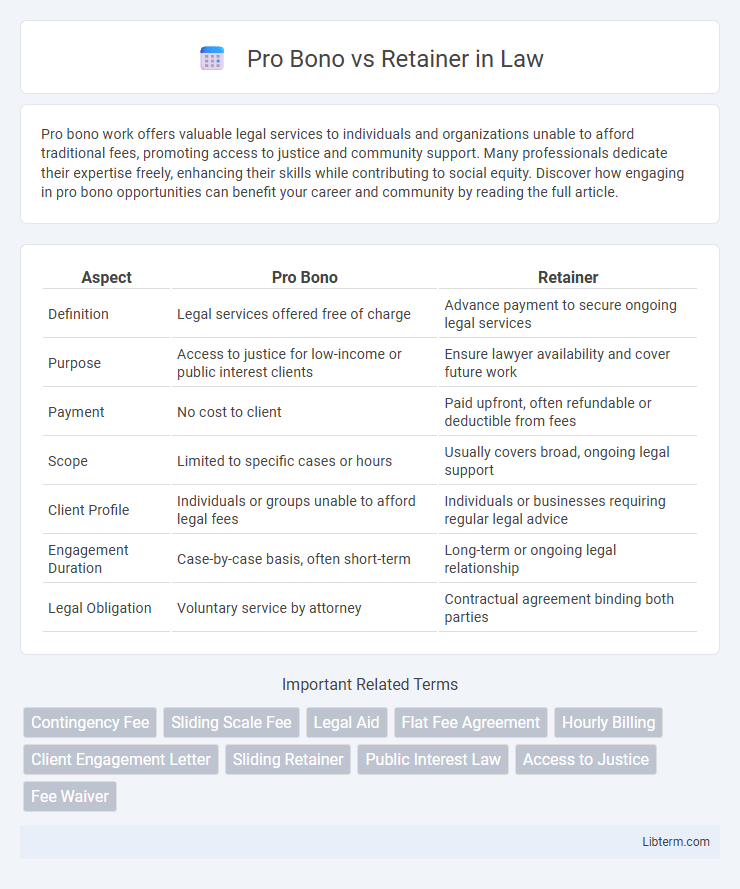Pro bono work offers valuable legal services to individuals and organizations unable to afford traditional fees, promoting access to justice and community support. Many professionals dedicate their expertise freely, enhancing their skills while contributing to social equity. Discover how engaging in pro bono opportunities can benefit your career and community by reading the full article.
Table of Comparison
| Aspect | Pro Bono | Retainer |
|---|---|---|
| Definition | Legal services offered free of charge | Advance payment to secure ongoing legal services |
| Purpose | Access to justice for low-income or public interest clients | Ensure lawyer availability and cover future work |
| Payment | No cost to client | Paid upfront, often refundable or deductible from fees |
| Scope | Limited to specific cases or hours | Usually covers broad, ongoing legal support |
| Client Profile | Individuals or groups unable to afford legal fees | Individuals or businesses requiring regular legal advice |
| Engagement Duration | Case-by-case basis, often short-term | Long-term or ongoing legal relationship |
| Legal Obligation | Voluntary service by attorney | Contractual agreement binding both parties |
Understanding Pro Bono Legal Services
Pro bono legal services involve attorneys providing free legal assistance to individuals or organizations unable to afford representation, emphasizing access to justice and community support. Unlike retainer agreements, which require upfront payment to secure ongoing legal counsel, pro bono work is voluntary and often driven by ethical commitments rather than financial arrangements. Understanding the scope and limitations of pro bono services is essential for clients seeking legal aid without the financial burdens associated with typical retainers.
What is a Legal Retainer?
A legal retainer is a fee paid upfront to secure the services of an attorney, ensuring their availability for ongoing legal matters or consultations. Unlike pro bono work, where attorneys provide free services typically for charitable or public interest cases, retainers establish a formal client-attorney relationship with guaranteed access and priority. Retainers often cover hourly work or specific legal tasks, creating a financial commitment that supports consistent legal representation.
Key Differences Between Pro Bono and Retainer
Pro bono services refer to professional work undertaken voluntarily and without payment, primarily for the public good or those unable to afford legal representation. A retainer involves a client paying an upfront fee to secure ongoing legal services or advice from an attorney, ensuring priority and availability. Key differences include compensation structure, client eligibility, scope of services, and the nature of commitment between lawyer and client.
When to Choose Pro Bono Representation
Choose pro bono representation when legal assistance is needed but financial resources are limited, especially for low-income individuals or nonprofit organizations. Pro bono services are ideal for cases involving public interest, social justice, or civil rights where affordable access to legal expertise is crucial. This option ensures access to quality legal support without the burden of ongoing fees or retainers.
Ideal Situations for Retainer Agreements
Retainer agreements are ideal for businesses and individuals requiring ongoing legal support, ensuring consistent access to a dedicated attorney without negotiating fees for each service. These agreements suit complex projects or long-term collaborations where predictable legal expenses help with budgeting and resource allocation. Clients benefit from priority service and a strengthened attorney-client relationship, facilitating proactive and strategic legal counsel.
Cost Implications: Pro Bono vs Retainer
Pro bono legal services incur no direct costs for clients, offering crucial assistance without financial burden, making them ideal for individuals or nonprofits with limited resources. Retainer agreements require upfront fees, which secure ongoing legal support and ensure priority access to a lawyer's expertise, potentially resulting in higher overall expenses but greater service continuity. Evaluating cost implications, pro bono services minimize monetary outlay while retainers provide predictable budgeting and consistent availability of legal counsel.
Accessibility and Eligibility Criteria
Pro bono services provide free legal assistance primarily to low-income individuals or organizations, making accessibility dependent on strict eligibility criteria often based on financial need and case type. Retainer agreements require clients to pay an upfront fee to secure ongoing legal representation, offering broader accessibility to clients who can afford regular payments but typically without income-based restrictions. Eligibility for pro bono work is usually determined by nonprofit organizations or legal aid societies, whereas retainer clients are evaluated based on their ability to pay and the scope of legal services needed.
Client Expectations and Commitments
Pro bono legal services involve attorneys providing assistance without charge, typically focusing on social justice or community causes, which sets client expectations for limited availability and scope. Retainer agreements require clients to pay upfront fees guaranteeing the attorney's commitment to prioritize their legal needs, ensuring continuous access and dedicated resources. Clients engaging retainer services anticipate ongoing communication, customized legal strategies, and a structured billing process aligned with the agreed terms.
Ethical Considerations for Lawyers
Ethical considerations for lawyers differ significantly between pro bono work and retainer agreements, as pro bono services emphasize access to justice and the professional responsibility to serve underserved clients without expectation of payment. Retainer agreements require transparent communication regarding fees, scope of representation, and potential conflicts of interest to uphold client trust and comply with professional conduct rules. Maintaining confidentiality, avoiding exploitation, and ensuring competence remain paramount in both contexts to fulfill ethical obligations effectively.
Making the Right Choice for Your Legal Needs
Choosing between pro bono and retainer legal services depends on your specific needs and financial situation. Pro bono services offer free legal assistance primarily for individuals or organizations unable to afford representation, while retainers involve upfront payments guaranteeing ongoing access to a lawyer's expertise. Evaluate the complexity of your case, anticipated legal requirements, and budget constraints to determine the optimal arrangement for effective legal support.
Pro Bono Infographic

 libterm.com
libterm.com